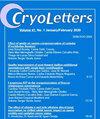抗氧化和抗生素处理对模式藻硅酸外露和特有藻亚洲动孢的低温保存效果评估。
IF 0.9
4区 生物学
Q3 BIOLOGY
引用次数: 0
摘要
海藻是一种应用广泛的光合生物,液氮低温保存是一种适合保存海藻的技术。虽然有一些关于海藻低温保存的标准协议,但大多数都依赖于昂贵的控制速率冷却器。此外,一些因素,如抗氧化剂或抗生素的使用,仍未被探索。目的研究2-巯基乙醇(抗氧化剂)与抗生素混合使用低技术被动速率冷却器对模式藻硅藻外露和特有褐藻亚洲动孢的低温保存效果。材料与方法在冷冻保护剂(CPA)溶液中加入s2 -巯基乙醇,在培养基中加入抗生素混合物。此外,还对两种CPA溶液在硅藻土上进行了试验。结果两周恢复后,PSC混合抗生素(青霉素G、链霉素和氯霉素)处理后解冻后存活率显著提高。抗氧化处理不能提高细胞活力。以10%甘油+ 10%脯氨酸为CPA溶液,对硅土田鼠和亚洲田鼠的存活率分别为64-83%和83-87%。采用低技术被动速率冷却器,10%甘油+ 10%脯氨酸溶液和抗生素处理,成功地冷冻了硅藻和亚洲田鼠。据报道,PSC抗生素混合物的解冻后存活率最高(64-87%),这表明在海洋大型藻类解冻后恢复过程中使用抗生素可能有好处。本研究首次报道了亚洲胡杨的冷冻保存。DOI: 10.54680 / fr23310110212。本文章由计算机程序翻译,如有差异,请以英文原文为准。
Assessing the benefits of antioxidant and antibiotics treatments for cryopreservation of the model alga Ectocarpus siliculosus and the endemic alga Acinetospora asiatica.
BACKGROUND
Cryopreservation in liquid nitrogen is a suitable technique for preserving seaweeds, a group of photosynthetic organisms with many applications. Although there are some standard protocols for seaweed cryopreservation, most rely on expensive controlled-rate coolers. Moreover, several factors, such as the use of antioxidants or antibiotics, remain unexplored.
OBJECTIVE
To test the effect of 2-mercapthoethanol (antioxidant) and antibiotic mixtures on the cryopreservation of the model alga Ectocarpus siliculosus and the endemic brown seaweed Acinetospora asiatica using a low-tech passive rate cooler.
MATERIALS AND METHODS
2-mercaptoethanol was added to the cryoprotectant (CPA) solution, while antibiotic mixtures were included in the culture medium during the recovery process. In addition, two CPA solutions were tested on E. siliculosus.
RESULTS
After two weeks of recovery, the treatment comprising PSC antibiotic mixture (Penicillin G, streptomycin, and chloramphenicol) showed a significant increase in post-thaw viability. Antioxidant treatment did not improve viability. The highest viabilities for E. siliculosus and A. asiatica were 64-83%, and 83-87%, respectively, using 10% glycerol + 10% proline as CPA solution.
CONCLUSION
E. siliculosus and A. asiatica were successfully cryopreserved using a low-tech passive rate cooler, 10% glycerol + 10% proline solution, and antibiotic treatment. The highest post-thaw viabilities (64-87%) reported for PSC antibiotic mixture suggest the potential benefits of using antibiotics during post-thaw recovery of marine macroalgae. This study is the first report on the cryopreservation of A. asiatica. DOI: 10.54680/fr23310110212.
求助全文
通过发布文献求助,成功后即可免费获取论文全文。
去求助
来源期刊

Cryo letters
生物-生理学
CiteScore
1.80
自引率
10.00%
发文量
50
审稿时长
1 months
期刊介绍:
A bimonthly international journal for low temperature sciences, including cryobiology, cryopreservation or vitrification of cells and tissues, chemical and physical aspects of freezing and drying, and studies involving ecology of cold environments, and cold adaptation
The journal publishes original research reports, authoritative reviews, technical developments and commissioned book reviews of studies of the effects produced by low temperatures on a wide variety of scientific and technical processes, or those involving low temperature techniques in the investigation of physical, chemical, biological and ecological problems.
 求助内容:
求助内容: 应助结果提醒方式:
应助结果提醒方式:


